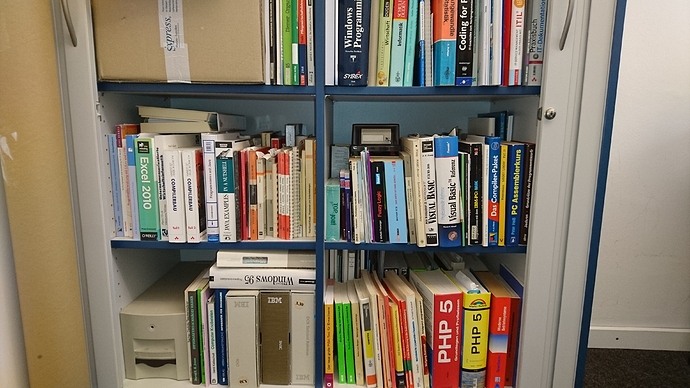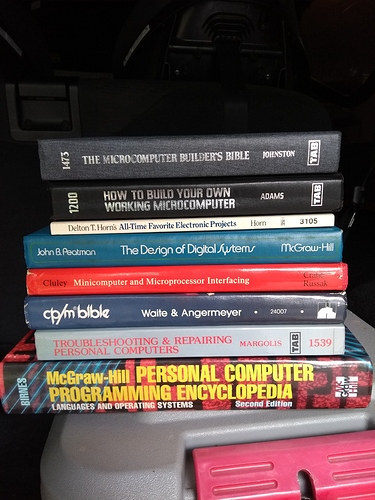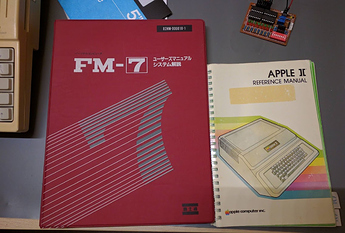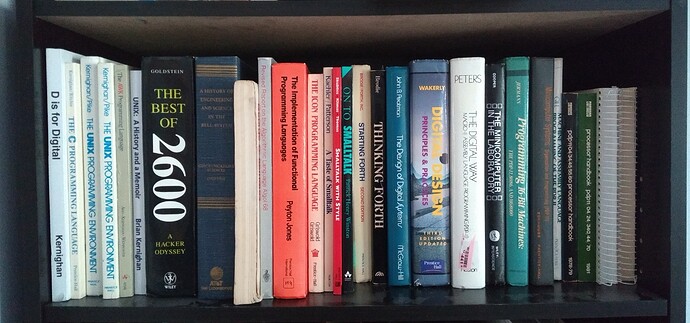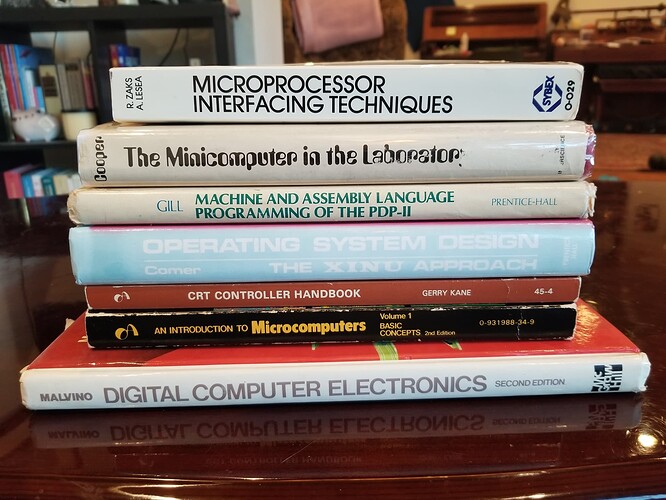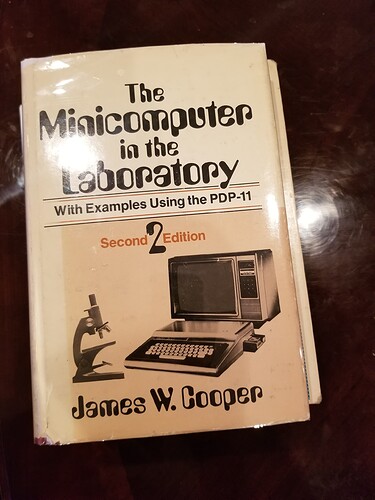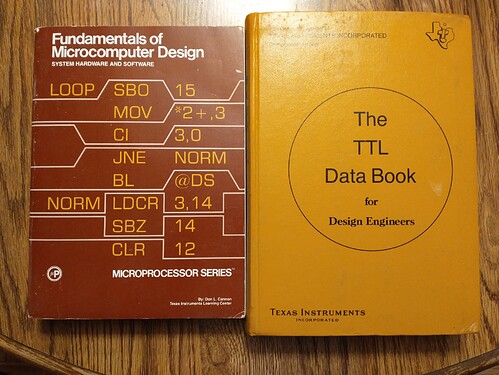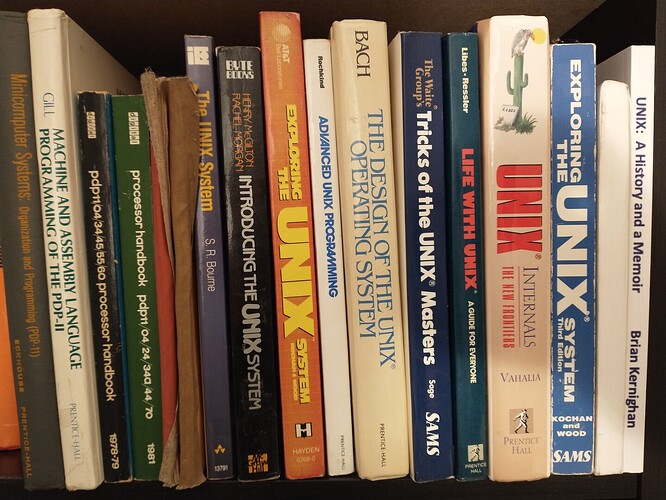Do I spy a first edition Horowitz and Hill?
Let me check… yes it is, first edition but third reprint, and of course in paperback. Might have been one of the first technical books I bought - although my Zaks book on 6502 must be earlier - I was studying Maths and someone else was studying Physics, and they were enthusiastic enough about the book that I bought it. I read it too, which doesn’t always happen…
I’m slowly preparing for retirement at the end of the year and sort out the paper bunch that has accumulated over the decades. I’m excited to see what’s in this shelf!
Aho and Ullman! Nice.
Wow! Nice find. Some classics there.
There were a lot more there, too. I was tempted to make an offer on the entire shelf, but I was already spending too much.
If I see a book I like, can you show the insides 
Nice to see books with real content.
Little late than never, but I must say. “Good 'ol TAB Books” They used to have a book on everything. I think I joined some electronics book club or something of that ilk. I had a bunch of their titles.
This is all of it for me, as far as retrocomputing goes. Doesn’t even need a shelf.
My bookshelf these days is archive.org, though I must admit that the paper copy of the Apple II Reference Manual is turning out to be darn convenient to use. (But I still need a modern machine up and running to take notes.
(I do have a hundred-odd more modern books—late '90s onward—in boxes, but those are all going to a shop to be cut and scanned, as soon as I get around to it. In the meantime, they’re taking precious space in my tiny Japanese apartment that’s needed for actual retrocomputers.)
It’s been a little while since we’ve had a shelfie, and my shelves have reorganized some with the pandemic (in particular, some office books have worked their way home!), so here’s a pleasing section of shelf that I noticed while pulling something down to browse in an idle moment (I chose The Implementation of Functional Programming Languages).
(The end-on book is a somewhat oversized book on ANSI standard BASIC, and the two spiral-bounds at the right hand side are HP calculator manuals (97 and … 28S or C?).)
Oh, I spot a time traveller’s almanach, “The Best of 2600”
(My best recommendations to John Titor, just in case.)

I found that, if I remember correctly, at the local Goodwill! Obviously I couldn’t pass it up…
So it’s a best-of compilation of “2600 Magazine, The Hacker Quarterly”, which was published starting in 1984 (quite fittingly for an editor named Emmanuel Goldstein). I didn’t know this at all.
(However, a PDF copy can be found via Google Scholar, so my ignorance may be subject to change.)
Oh; sorry, I misunderstood your comment! It should have occurred to me that 2600 is very likely a strongly American phenomenon, or at least historically may have been so. Yes, 2600 is a newsletter/magazine that started out dealing mostly with the inner workings of the US telephone system under the newly-broken regulated AT&T monopoly (2600 being a reference to the 2600 Hz tone used to indicate an idle line that could, on some lines, be manually reproduced to end toll charges for a call that was still in progress). In its later years it has branched out into many other topics of hacker interest, including computing, and is still a going concern in 2020.
2600 has often been viewed askance by the establishment, as while it is not actually about “black hat” hacking, it often makes little distinction between the ethical and un-ethical uses of its topics, and the regular contributors often have … shall we say, ethical differences with the establishment, anyway. Other publications in this space include things like Phrack, which has some similarities to 2600 but (to my knowledge) was never in print publication.
For those intrigued by the appearance of A History of Engineering and Science in the Bell System: Communications Sciences on the shelf above, Bell Labs produced quite a number of volumes (more here) on their work which will be of anything from tangental to a direct interest to those interested in retrocomputing.
The communications volume looks to be more on the computing science side and data transmission side (though it does have a couple of chapters directly discussing early computing hardware and systems, and the chatpers on behavioural science and economics may be interesting). But the Switching Systems (1925-1975) volume (35 MB PDF copy) was fascinating because telephone switches essentialy started as a sort of special-purpose computer (and soon became run by general purpose computers). It’s also an interesting history into another form of internetworking, but still one involving the exchange of digital data from very early on!
The reason I have it is that it is the volume that discusses Unix and the CSRC work surrounding that. What turned out to be the most interesting to me, however, was probably its discussion of the development and capabilities of the early Bell relay computers!
Not exactly a shelf, but I’ve been expanding my retrocomputing library. This new stack has a couple of @elb 's recommendations. Thanks @elb !
I’ve been hunting for that Malvino ever since I started watching Ben Eeater’s videos 2 years ago; finally found an affordable copy!
The cover of “The Minicomputer in the Laboratory” is pretty funny:
That’s definitely a TRS-80 Color Computer 1 sitting (but not wired up to anything!) in front of a TV set.
Another not-quite-a-shelfie, but some reading material for working on my TMS 9900 homebrew just arrived. (I’m on Mk. 1, Mk. 0 boots but became … unmanageable. I’ll document the journey, eventually!)
It’s been over a year since our last shelfie! I’ll try to revive the tradition with a little Unix-oriented shelfie that I just sorted together:
After the (topical) PDP-11 books on the left, we have Unix from 1977 (the two taped spines there are an original NSW printing of the Lions Commentary on Unix Version 6) to 2020 (Brian W. Kernighan’s UNIX: A History and a Memoir). In between are Stephen Bourne’s The UNIX System from 1977, Introducing the UNIX System by McGilton and Morgan (1983), Exploring the UNIX System by Kochan and Wood (1984), Advanced UNIX Programming by Rochkind (1985), The Design of the UNIX Operating System by Maurice Bach (1986), Tricks of the UNIX Masters by Sage (1986), the famous Life with Unix by Libes and Ressler (1989), Unix Internals: The New Frontiers (1996) by Vahalia, Exploring the Unix System again in 3rd Edition (1992), and finally a 1990s reprint of the Lions Commentary before we return to Kernighan.
Not Pictured here are The Unix Programming Environment by Kernighan and Pike (signed by bwk at VCF East 2019!), Richard W. Stevens’ Advanced Programming in the Unix Environment, and probably some other titles.
Some of these books are very excellent, some are not as great; if I had a better memory I’d be able to tell you which were which. ![]() The Kernighan and Lions books on the ends are absolutely fantastic, of course.
The Kernighan and Lions books on the ends are absolutely fantastic, of course.
